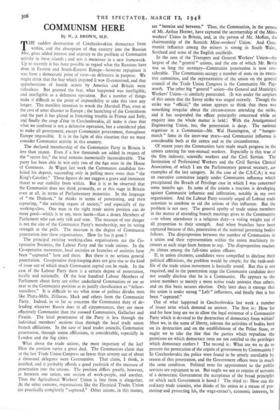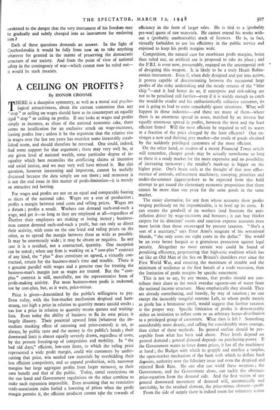COMMUNISM HERE
By W. J. BROWN, M.P.
THE sudden destruction of Czechoslovakian democracy from within, and the absorption of that country into the Russian bloc, gives added interest and urgency to the problem of Communist activity in these islands ; and sets it moreover in a new framework. Up to recently it has been possible to regard what the Russians have done in Eastern and South-Eastern Europe—however repugnant it was from a democratic point of view—as defensive in purpose. We might think that the fear which inspired it was ill-conceived, and that apprehensions of hostile action by America and Britain were ridiculous. But granted the fear, what happened was intelligible, and intelligible as a defensive operation. But a number of things make it difficult to the point of impossibility to take this view any longer. The manifest intention to wreck the Marshall Plan, even at the cost of utter disaster to Europe ; the launching of the Cominform and the part it has played in fomenting trouble in France and Italy, and finally the coup d'etat in Czechoslovakia, all make it clear that what we confront is not a defensive operation, but a considered plan to make all government, except Communist government, throughout Europe impossible. It is in the light of this situation that we must consider Communist activity in this country.
The declared membership of the Communist Party in Britain is less than 50,000. Even if a few thousands are added in respect of the " secret list," the total remains numerically inconsiderable. The party has been able to win only two of the 64o seats in the House of Commons. At Wigan last week the Communist candidate for- feited his deposit, succeeding only in polling more votes than " the King's Cavalier." These figures do not suggest a grave and imminent threat to our stability from within. But it is to be observed that the Communist does not think primarily, or at this stage in Britain even at all, in terms of Parliamentary majorities. In the language of " the Dialectic," he thinks in terms of penetrating, and then capturing, " the existing organs of society," and especially of the working-class. One man in the right trade union position can do more good—which is to say, more harm—than a dozen Members of Parliament who can only talk and vote. The measure of our danger is not the size of the Communist Party's membership, nor its voting strength at the polls. The measure is the degree of Communist penetration into these organisations. How far has it gone ?
The principal existing working-class organisations are the Co- operative Societies, the Labour Party and the trade unions. In the Co-operative movement, local societies or branches of societies have been " captured " here and there. But there is no serious general penetration. Co-operative shop-keeping does not give rise to the kind of issue out of which much Communist capital can be made. In the case of the Labour Party there is a certain degree of penetration, locally and nationally. Of the four hundred Labour Members of Parliament about forty are either undeclared Communists or are so near to the Communist position as to justify classification as " fellow- travellers." It is difficult to see what issue of politics divides men like Platts-Mills, Zilliacus, Mack and others from the Communist Party.. Indeed, in so far as concerns the Communist duty of de- fending whatever Russia does in all circumstances, they are more effectively Communist than the avowed Communists, Gallacher and Piratin. The local penetration of the Party is less through the individual members' sections than through the local trade union branch affiliations. In the case of local trades councils, Communist penetration, through union affiliations, is considerable, especially in London and the big cities.
What about the trade unions, the most important of the lot?
Here the position varies a great deal. The Communists claim that at the last Trade Union Congress no fewer than seventy out of about a thousand delegates were Communists. That claim, I think, is justified, and it probably affords a good yardstick of the measure of penetration into the unions. The position differs greatly, however, as between one union, one section of work-people, and another. Thus the Agricultural Workers' Union is free from it altogether. At the other extreme, organisations like the Electrical Trades Union are practically completely " captured." Other unions, in this matter, are " betwixt and between." Thus, the Communists, In the person of Mr..Arthur Homer, have captured the secretaryship of the Mine- workers' Union in Britain, and, in the person of Mr. Moffatt, the chairmanship of the Scottish Mine-workers' Union. And Com- munist influence among the miners is strong in South Wales, Scotland and some of the English coalfields.
In the case of the Transport and General Workers' Union—the largest of the " general " unions, and the one of which Mr. Bevin was so long the secretary—Communist penetration is now con- siderable. The Communists occupy a number of seats on its execu- tive committee, and the representative of the union on the general council of the Trade Union Congress is the Communist Mr. Pap- worth. The other big " general" union—the General and Municipal Workers' Union—is similarly penetrated. (It was under the auspices of this union that the Savoy strike was staged recently. Though the strike was " official," the union appears to think that there was something irregular about the circumstances attending the strike, and it has suspended the officer principally concerned while an enquiry into the whole matter is held.) With the Amalgamated Engineering Union, too, the penetration is deep. The national organiser is a Communist—Mr. Wal Hannington, of " hunger- march " fame in the inter-war years—and Communist influence is considerable both at the centre and at the circumference.
Of recent years the Communists have made much progress in the unions catering for non-manual workers. Especially is this true of the film industry, scientific workers and the Civil Service. The Institution of Professional Workers and the Civil Service Clerical Association, of which I am the Parliamentary general secetary, are examples of the last category. In the case of the C.S.C.A.; it was an executive committee largely under Communist influence which precipitated the Breach of Privilege case in which I was concerned some months ago. In some of the unions a reaction is developing against Communist influence and infiltration, notably in my own organisation. And the Labour Party recently urged all Labour trade unionists to combine to rid the unions of this influence. But the problem is not easy. The general apathy of trade union members in the matter of attending branch meetings gives to the Communists —to whom attendance is a religious duty—a voting weight out of all proportion to their strength. And when branches have been captured because of this, penetration of the national governing bodies follows. The disproportion between the number of Communists in a union and their representation within the union machinery in- creases at each stage from bottom to top. The disproportion reaches its climax among the full-time union officers.
If, in union elections, candidates were compelled to disclose their political affiliations, the problem would be simple, for the rank-and- file of the trade union movement is basically sound. But this is not required, and in the penetration stage the Communist candidate does not usually disclose that he is a Communist. He appears to the union members as merely a more active trade unionist than others, and on this basis secures election. Only later does it emerge that the union is under strong "Left " influences, and finally that it has been " captured."
Out of what happened in Czechoslovakia last week a number of issues arise which demand an answer. The first is: How far and for how long are we to allow the legal existence of a Communist Party which is devoted to the destruction of democracy from within? Must we, in the name of liberty, tolerate the activities of bodies bent on its destruction and on the establishment of the Police State, or ought we to take the line that the parties which -repudiate the premisses on which democracy rests are not entitled to the privileges which democracy confers ? The second is: What are we to do to prevent the penetration of the organs of government by Communists ? In Czechoslovakia the police were found to be utterly unreliable by reason of this penetration, and the Government offices were in much the same condition. Political tests for appointment to the public services are repugnant to us. But ought we not to require of servants of a democratic Government the acceptance of the broad principles on which such Government is based ? The third is: How can the ord;nary trade unionist, who thinks of his union as a means of pro- moting- and protecting his, the wage-earner's, economic interests, be awakened to the danger that the very instrument of his freedom may be gradually and subtly changed into an instrument for enslaving him ?
Each of these questions demands an answer. In the light of Czechoslovakia it would be folly from now on to take anything whatever for granted in the matter of preserving the democratic structure of our society. And from the point of view of national safety in the contingency of war—which cannot now be ruled out— it would be stark insanity.



































 Previous page
Previous page